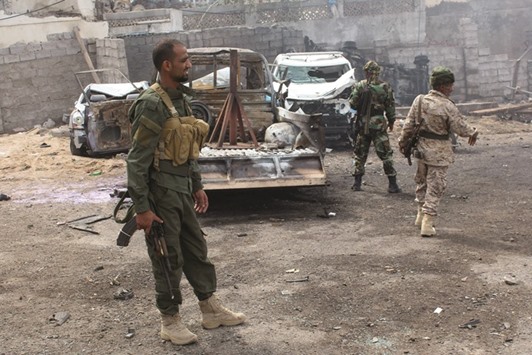The UN’s Yemen envoy yesterday hailed the “positive atmosphere” at crucial peace talks between the country’s warring sides, as negotiations in Kuwait entered their second week without a major breakthrough.
UN special envoy Ismail Ould Cheikh Ahmed has held several rounds of talks with Shia Houthi rebels and a government delegation over the past two days focussing on key issues.
Besides discussing ways to firm up an ongoing ceasefire, delegates also tackled “the issues related to the withdrawal of armed groups, handover of heavy weapons, resumption of the political transition and the release of prisoners and detainees,” Ould Cheikh Ahmed said in a statement.
He said a “positive atmosphere” prevailed during talks but warned that differences remained.
“The divergence of views is to be expected in a country witnessing war. It is crucial that all parties make concessions... in order to reach a comprehensive political agreement,” he said.
More than 6,800 people have been killed and around 2.8mn displaced in Yemen since a Saudi-led Arab coalition began operations in March 2015 against the Iran-backed Houthis, who have seized swathes of territory including the capital Sanaa.
After the start of the latest round of negotiations was delayed as the rebel delegation sought guarantees, Ould Cheikh Ahmed has managed to get the two sides to approve the agenda and has begun debating key issues.
Sources close to the negotiations however said the two delegations have not yet met face-to-face.
The government delegation proposed a mechanism on how to implement the withdrawal of the rebels and handover of heavy arms, a Yemeni official said.
“We are optimistic over the prospects of an agreement being worked out by the UN envoy,” Mani al-Matari, the press adviser to Yemen’s foreign minister, told AFP.
The main sticking point remains that the rebels want to discuss a political settlement before surrendering arms while the government delegation insists on the implementation of UN Security Council resolution 2216.
The resolution states that the rebels must withdraw from seized territories and disarm before talks can progress.
The government delegation also submitted a letter of “strong protest” to the UN envoy over alleged rebel ceasefire violations, especially in third city Taez, Matari said.
Ould Cheikh Ahmed said the negotiations have no timeframe.
The 15-member UN Security Council on Monday stressed the importance of agreeing on a “roadmap” to implement security measures including the withdrawal of heavy weapons from Yemen.
Al Qaeda suicide bomber targets Aden police chief
A suicide bomber yesterday targeted the police chief of Yemen’s second city Aden in the latest attack against senior officials in the base of the Saudi-backed government, a security official said.
The bombing came after loyalist forces backed by a Saudi-led military coalition seized the key southeastern port city of Mukalla and the nearby airport and oil facilities from Al Qaeda, ending a year-long occupation by the militants.
General Shallal Shayae escaped unharmed from the attack but one guard was wounded when the bomber blew up a vehicle packed with explosives, the official said.
A witness said the bomber, dressed as a woman, was stopped at a checkpoint on the perimeter of the compound around the general’s house, where he blew himself up.
There was no immediate claim of responsibility for the bombing, but Shayae has survived attacks by militants more than once.
In February, suspected Al Qaeda militants opened fire on a convoy carrying Shayae and Aden governor Aidarus al-Zubaidi, but they escaped unharmed.
Shayae and Zubaidi also survived a car bombing that targeted their convoy in Aden on January 5 killing two of their guards.
The port city has seen a growing militant presence since loyalist forces backed by the Saudi-led coalition drove Houthi Shia rebels out of the city in July.
For the first 12 months of the intervention that the coalition launched in March last year, it focused its firepower on the rebels, creating a power vacuum that was exploited not only by Al Qaeda, but also by rival militants of the Islamic State group.
As a ceasefire with rebels went into effect on April 11, the loyalists and their allies turned their guns on the militants, driving them out of a string of southern provincial capitals and imposing heavy losses.
Washington regards Al Qaeda’s Yemen-based branch as its most dangerous and has waged a drone war against its commanders since 2002.

Yemeni loyalist forces gather at the scene of a suicide attack targeting the police chief in Aden.
